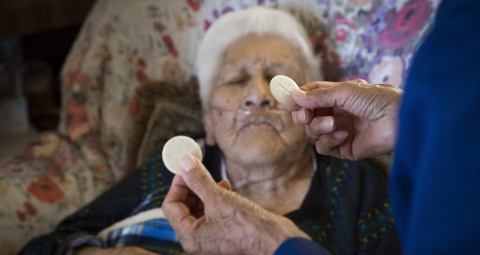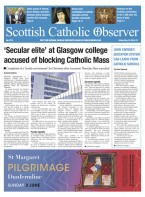May 18 | ![]() 0 COMMENTS
0 COMMENTS ![]() print
print

The dreadful reality of dying in secular America
In his Letter from America, BRANDON MCGINLEY looks at a money-driven approach to elderly care
Dependence is the most damning sin we have in our post-Christian world. To be dependent is to encroach upon others’ autonomy, and we can imagine no worse offence. You can even be killed for it.
When we think of persons made expendable by their dependence, we generally think first of the unborn.
Pro-abortion apologetics often go so far as to praise the act of killing as a grand victory of the dignified autonomy over obnoxious dependence.
But once they’re born, we generally cut children some slack. Most people would still consider it ghastly to kill or to abandon an infant. This intuition may be a vestigial remnant of the Christian understanding of our duties to the weak, but more likely it is strictly utilitarian: babies won’t be dependent forever; someday they will become useful and will have the dignity of autonomy.
What happens to people, though, who will be neither fully autonomous nor useful ever again? What do we do with the dependent elderly?
I spoke recently with a young priest who had spent several years working in the diocesan seminary and chancery, but had recently been assigned to a parish with an aging congregation. For the first time as a priest he was confronted with the dreadful reality of dying in America.
Fr Tom (we’ll call him) regularly found himself alone with dying parishioners who had no one else by their side. Their spouses had died some time ago, and the rest of their families were no longer in town or no longer interested.
He watched people—men and women who had raised children and grandchildren, who had favourite colours and flavours of ice cream, who could tell you how they felt on VE-Day and during the Cuban Missile Crisis, who had travelled and studied and brawled and cried and loved—relinquish their last breath to the sound of blaring soap operas.
The lobbies of these nursing homes, Fr Tom observed, are usually pristine and attractive. It’s on the second floor that the reality is revealed. He once visited a woman who was on the verge of death only to find her alone and her linens soaked through with urine, while the staff remained preoccupied with their phones. The distant relative who was apparently in charge of her maintenance complained to him that the family was shelling out about £4,000 per month for such care.
You can see here the enterprising spirit that defines so much of modern culture: we have figured out how to make even the bedridden elderly into economically useful commodities—by extracting as much of their life’s savings as possible before changing the bedsheets for a new ‘client.’ Some doctors even specialise in hastening death (and expanding profits) by medicating the elderly into a stupor. Dependence voids dignity.
This crisis is in part an unavoidable side-effect of ever-increasing life expectancies. It’s true that traditional models of care—such as bringing ageing relatives into multi-generational family households—are not as well-suited as they once were to the task of supporting the elderly.
But the truth is that we haven’t even tried to make them work. Even if a greater share of the elderly do require specialised care, many still do not need anything beyond what a loving family can provide. If we can organise our homes around clumsy and incontinent toddlers, we can do the same for clumsy and incontinent grandparents.
For the increasing number who do require expert end-of-life care, Catholic institutions need to take a leading role. The current system in America is dominated by utilitarianism, driven by profit and a
philosophy that sees a hastened death as more dignified than continued dependence. Our elderly—especially Catholics who wish to die as they lived, faithful to Church teaching—deserve better.
As long as we abhor dependence, though, little can change. The elderly challenge us in a way even young children do not by presenting us with terminal, rather than transitional, dependence. They are an unsettling reminder both that we are never free of our duties to the dependent and that, in all likelihood, we will someday be dependent as well.
This is simply part of what it means to be human: we are all dependent first and foremost on God. If dependence is undignified, then we are all wretches. But our dignity comes not from our precious autonomy but from our relationship with the Creator and Sustainer of the universe. Only when we recognise this can an ethic of mutual service replace the anti-ethic of autonomy.











